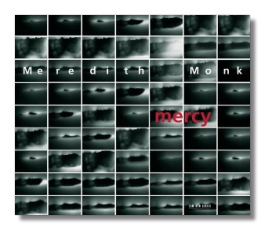
The Internet's Premier Classical Music Source
Related Links
- Latest Reviews
- More Reviews
-
By Composer
-
Collections
DVD & Blu-ray
Books
Concert Reviews
Articles/Interviews
Software
Audio
Search Amazon
Recommended Links
Site News
 CD Review
CD Review
Meredith Monk

mercy
Meredith Monk, Allison Easter, Katie Geissinger,
Ching Gonzalez, John Hollenbeck: voices
Allison Sniffin, piano, synthesizer, viola, violin, voice
John Hollenbeck, percussion, marimba, vibraphone, melodica, piano
Bohdan Hilash, clarinets
ECM New Series 1829 472468-2 DDD 57:23
mercy, Meredith Monk's first new ECM New Series release in almost six years, is a story for which you, the listener, will have to supply most of the words. The booklet contains not one word about the music and the performers, although there are some artistic photographic images of the latter. The press release – which most listeners will have no access to, of course – does fill in some of the gaps. (In the press release, it is written that "liner notes [were] planned, but in the end, it was felt that the music, with these images, speaks for itself in a clear and unequivocal way." Indeed, it does speak for itself, but whether or not the speech is "clear and unequivocal" is a matter of opinion. Knowing Monk's earlier work, I can't help thinking that she had something more subjective in mind.)
This "song cycle," if you will, is in fourteen sections. Most of them are vocal, and include parts for as few as one and as many as six voices. As one would expect from Monk, traditional singing is just one of the vocal techniques used in mercy. Chanting, whispering, panting, and other percussive and semi-percussive means of producing sound are used. Heard with half an ear, Monk's work can seem pretentious or just silly – what does one make of a woman rasping out (apparently) nonsense syllables like an old crone? However, if one "goes with the flow," the music's integrity reveals itself, and even mercy's most outré moments make sense. A few words in English and other languages – a series of "help"s, two "Come in"s – suggestive a narrative, as do the section titles: "masks," "doctor / patient," "woman at the door," and "prisoner," to name four. What that narrative is, exactly, is up to the listener. One might imagine a totalitarian nightmare, and the deliverance of the downtrodden protagonists though human compassion. Your mileage might vary. In fact, it probably will. The press release calls the work "a meditation on the quality of mercy throughout history, and a humanistic demand for mercy in troubled times." That works. No doubt some of the uncertainties would have been defined by the stage work of which mercy, in an earlier form, was a part.
The voices are accompanied by understated instrumental lines, mostly minimalist, and some more impressionistic swaths of sound in which Bohdan Hilash's clarinets play a prominent role. However, as is always the case with Monk's work, it is the voices that are the center of attention.
The studio recording offers state-of-the-art definition, although not much of a sense of performance space. The result is that mercy becomes theater of the mind.
While it doesn't redefine what Meredith Monk is all about, mercy is a worthwhile addition to her discography, and it is enthusiastically recommended to the ever-rarer adventurous souls who don't expect music to be merely passive entertainment.
Copyright © 2002, Raymond Tuttle


















